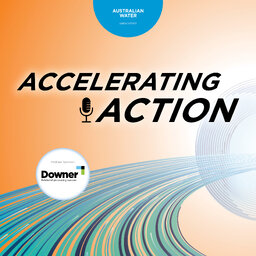Biosolids gasification. A deep dive into an Australian first initiative with Rob Martinovic of Downer
Australian Water Association Podcast - Accelerating Action
The Australian Water Association's Accelerating Action Podcast Series brings you water industry information, projects and research from professionals …In the latest episode of the Accelerating Action podcast, Rob Martinovic (Technology Director, Gasification, Downer) sits down with the Australian Water Association to discuss an Australian first initiative demonstrating how sewage sludge can be transformed into biochar and energy.
For those unfamiliar with biosolids, it's a by-product of wastewater treatment. Every wastewater treatment plant in Australia generates biosolids. Previously, it was just sent to farmers to compost however in recent years, there's been an increasing awareness of what's in biosolids beyond just carbon and phosphorus. Water authorities also pay to get rid of biosolids which can amount to hundreds of thousands of tons each year. So how we do solve this substantial for the industry?
Gasification facility
“The water industry has been reluctant to raise water rates, so the cost burden is on the utilities and so there's been a big push to look at how do we mitigate some of those costs” said Rob.
“There’s been a lot of work done that Downer and some of its Partners have done over several years to look mitigating operating costs and destroy contaminants and it's led us to what was built at Logan”.
Downer has partnered with Logan City Council and delivery partner Pyrocal to create an Australian first by successfully turning biosolids (sewage sludge) into renewable energy and a sustainable biochar product at the Loganholme Wastewater Treatment Plant (WWTP).
“It's the first of its type on a municipal scale. There is a lot of research by others as well in this field, we're not the only ones, it's just that we are the first who have been able to demonstrate it at a scale that can be built and is now operating and is fully functional”, said Rob.
Biochar
The biosolids gasification process is how sewage sludge can be dewatered, dried, and then treated with high temperatures in a low-oxygen environment to produce biogas. Recovered energy in the biogas is used to power the drying and heating processes. The gasification facility is energy neutral, with 70 per cent of the energy in biosolids recovered and reused, and the remaining energy sourced from an onsite solar power system.
The gasification facility will reduce the volume of biosolids by 90 per cent and produce a safe, environmentally friendly biochar, which is a soil conditioner that can be added to potting mix, providing a sustainable solution for the waste product. The gasification process also reduces CO2 output by 4,800 tonnes annually and prevents organic pollutants from entering the soil.
“We're taking the biosolids which look like wet mud essentially and through a number of sort of steps, we end up with a very hard pellet called biochar.” Said Rob.
Recognition and achievements
The gasification facility was awarded the National Infrastructure Project Innovation Award (Metro) at the Ozwater’23 Gala Dinner in 2023, recognising the work of the Logan Water Partnership including Logan Water, Downer, WSP in Australia, Stantec, and Australian Renewable Energy Agency (ARENA).
Biochar also featured in a short ABC documentary ‘The Number 2 solution’, with a starring role by Johanna Johnson, the Queensland Young Water Professional of the Year for 2022.
You can watch the documentary here.
Subsequently, Logan Water will no longer pay contractors about $1.8M a year to truck 34,000 tonnes of biosolids from Loganholme Wastewater Treatment Plant (WWTP) 300km to the Darling Downs agricultural area for disposal. Operational cost savings and carbon credits will return almost $1M a year to the City of Logan, and a new revenue stream is being created from biochar sales.
A sustainable outcome
This project will leave a legacy for the City of Logan and the Australian water industry by:
- advancing the achievement of the United Nations Sustainable Development Goals.
- encouraging water businesses to take a more sustainable approach to managing the 2.3M tonnes of dewatered biosolids produced each year in Australia (AWA, 2019).
- developing new legislation with the Queensland Department of Environment and Science to guide the production and use of biochar.
- reducing energy use for City of Logan operations and increasing use of clean energy.
- helping Council to meet its target of carbon neutral operations by the end of 2022.
- reducing operating costs for Council, enabling funds to be redirected to other services.
- sequestering carbon and supporting the economy by providing biochar to industry.
“We feel very fortunate that we're in a position where a real benefit to the Australian environment can be achieved.” Said Rob.
Season 8, Accelerating Action is proudly sponsored by Downer
 Australian Water Association Podcast
Australian Water Association Podcast


